Preparing for Easter 2010 at the Marist novitiate, Tutu, on Fiji's Taveuni island, Australian Marist, Fr Ben McKenna, writes in the aftermath of 'Tomas', Fiji's worst-ever cyclone...
Warm greetings from Tutu, as we recover here from cyclone Tomas: the phone line was just restored today - which is the reason I’m slow in correspondence. However we are still smiling here, and have been mercifully spared any loss of life.
We received our first warning of Cyclone Tomas on Friday 12th of March: on that day the children were sent home from school, and people were asked to prepare for what was at that stage a category 2 cyclone.
On Saturday 13th the winds started picking up: slowly and gradually. Tomas was in no hurry, and was intensifying. We trimmed our tapioca plants, and our kava plants of their leaves, and began putting up shutters on our windows. The sky turned dark and menacing. On Sunday 14th the road was already being damaged by the sea – with rocks washed up onto the coastal road– and the sea eroding the foundations. Four families in the vicinity of the Novitiate sought shelter with us: we were very happy to receive them. We continued to baton down our place and put up more shutters. We also put our animals [sheep, pigs, chickens] and various machines [brush-cutters, lawn mowers & chainsaws] in safe places out of the path of direct damage.
By Monday 15th we heard that Tomas was now a category 4 cyclone, with very destructive winds of 165 km/hr and gusts of up to 230 km. We were directly in its path. That day we received 331mm of rain. Tomas reached the pitch of intensity between 10 pm and midnight. Even in our shuttered concrete safety we could feel the 'whomf' of the shutters. The rain was horizontal. Trees were coming down. The sea was roaring. By 2 am Tomas had passed, and the winds now came back the other way – with equal and opposite force - flattening many other structures and trees that had survived so far but were already weakened and leaning.
Tuesday 16th the daylight revealed a scene of boken and fallen trees, destroyed gardens of root crops: tapicoka, dalo, yaqona [kava]; of fruit trees: breadfruit, pawpaw, lemons, bananas; and vegetables: cabbages, tomatoes, corn, & eggplant. The roads in, out, and around our property were covered with fallen trees. The water to our community had been cut by a fallen tree breaking the pipe. Our hydro power was off.
We set to work that day to restore the priorities: clear the main roads, put the water on, and get the power back on. By evening of the 16th we had achieved these objectives.
The next day – 17th, St Patrick’s Day, we were able to venture out of the property and find out what was happening in the rest of the Taveuni community. We found out that the communications tower for this part of the world [on Deveaux Peak] had been blown down. The control tower at the Matei Airport had been blown away. The wharf had been very badly eroded by the heavy seas. The grader for road repair had slipped of the road in a landslide of loosened hillside. We were without communications, planes, ships, and road maintenance capabilities. As I relayed these finding to Leke – our acting superior and farm manager here – he smiled, shook his head and uttered: 'A litany of disasters'!
Despite all of this we now have limited communications, the planes are flying again, the main road is being repaired, the wharf is operational, and extra road maintenance equipment has been brought to the Island.
The novices are in the middle of their first 8-Day Retreat, and doing very well: total silence: but we clean up in between the meditation times and in the afternoons.
Australian and NZ Governments have come to the aid of the Fijian Community, and the Military Government is very well organized in its response.
This is the worst cyclone that Fiji has ever experienced. However we have only heard of one woman losing her life [one too many] – the people here are experienced in what to do in these situations.
We are alive, knocked around, but smiling, praying, and getting on with restoring our lives. The planes are flying, the ships are operating, the power is on, the water is on: and we have plenty of space for visitors: so if you’d like to come and stay for a while then you are most welcome! [Just bring a chainsaw and some building materials….!]
With you as we prepare to celebrate the death and resurrection of the Lord, in Christ...
Ben McKenna
|
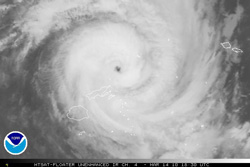
The weather man's view of 'Tomas'
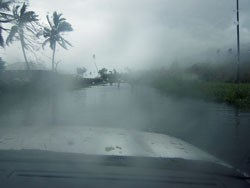
During the blow
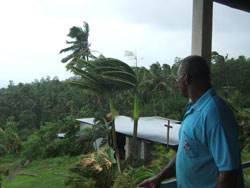
Fierce winds over Tutu
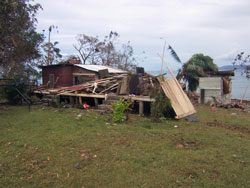
Buildings / and wharf damage
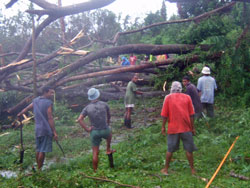
Clearing the debris /
novices during their retreat!
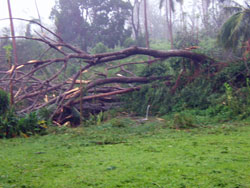
Fallen trees
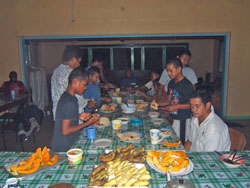
Families taking refuge with the
Marist novitiate community

Fr Ben McKenna (right) with local families taking shelter with the Tutu Marist community
|

